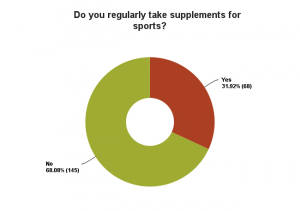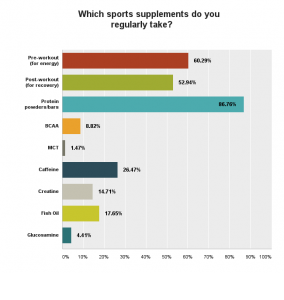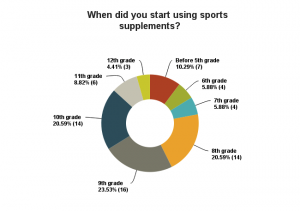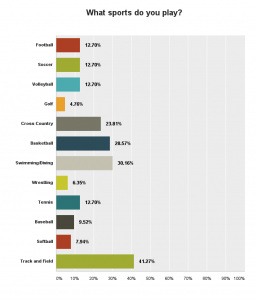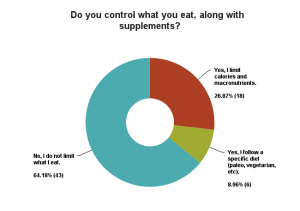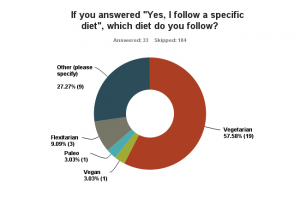Today’s society is dominated by sports and athletics. This costly obsession in turn spills into our lives, with ads plastered everywhere for sporting brands and fitness accessories endorsed by “perfect” bodies. Unfortunately, many people rely heavily on sports supplements to attain their athletic prowess. They expect that with minimal work and excessive use of supplements they will be able to attain their goals. Contrary to the common misconception that supplements can be a quick, easy replacement for a good diet, they are solely meant to be used as their name implies: as supplementary nutrition. Also, with the overwhelming stimuli from the media, children and adolescents are beginning to use supplements at a younger age, even though many of them are dangerous and can have adverse effects on developing bodies.
Currently, the number of sports supplements on the market is huge, with products for everything from weight loss to muscle building to increased endurance. Some of the most popular sports supplements include: pre-workout, post-workout, protein powders and bars, BCAA (branch chain amino acids), MCT (medium-chain triglycerides), caffeine, creatine, fish oil, and glucosamine.
PRE-WORKOUTS
Pre-workout supplements were first introduced in the 1980s and 1990s and are used to boost energy. They help athletes finish longer and better workouts, resulting in more muscle gain and overall physical improvement. Athletes who participate in power sports such as football and weightlifting often use pre-workout supplements. What make pre-workout supplements so potent and effective, but also risky, are ingredients such caffeine and creatine.
Caffeine is Generally Regarded as Safe (GRAS), but is usually not recommended for adolescents, and consuming more than 250 mg per day can cause heart problems. Creatine is another potent ingredient in pre-workout supplements, and is used to extend the time of muscle contraction, thus allowing more muscle growth. Despite the positive effects of supplements, there are also many common side effects, including dehydration, high blood pressure, kidney damage, muscle spasms, insomnia, diarrhea, and nausea.
POST-WORKOUTS
While pre-workouts are used before exercising, post-workout supplements are consumed afterward. They range from protein bars to flavored protein shakes, but they all share one similarity — they help muscle recovery after a workout by increasing the rate of muscle growth.
Post-workout supplements are not limited to any one group of athletes, but in general, football players and weightlifters do tend to use more concentrated supplements such as whey protein isolate and branched-chain amino acids (BCAA). Protein powders, especially whey, are ideal because they can be absorbed quickly and help muscle repair; however, whey is dairy based so it may cause indigestion, diarrhea, or allergic reactions. BCAAs can be used independently from protein supplements to decrease the amount of time required for absorption and increase the rate of muscle repair. Some side effects of BCAAs are nausea, pain, and headaches.
MISCELLANEOUS SUPPLEMENTS
Other common sports supplements include fish oil, medium-chain triglyceride (MCT) oil, and glucosamine. Fish oil is ideal for nearly anyone, since many people lack healthy omega 3 and 6 fats in their diets. Some of the benefits of fish oil are heart disease and asthma prevention, cholestrol control, and eye protection. Overuse of fish oil can result in reduced immune system activity, heartburn, and nausea.
Like fish oil, MCTs are healthy fatty acids that are immensely popular among bodybuilders since they are supposed to help with fat loss. However, they can cause diarrhea, nausea, vomiting, and stomach discomfort. Glucosamine is another widely used substance to ease joint pain and arthritis pain. Some side effects include nausea, diarrhea, and constipation.
THE ACADEMY
According to a recent Advocate poll, the trend at the Academy seems to be that 32 percent of the athletes use supplements. Also, contrary to popular belief, swimmers, divers, runners, and basketball players tend to use them more frequently than athletes participating in soccer or wrestling. Through protein powders and artificial supplements, most of these athletes try to maximize their recovery times and their energy.
Many are introduced to these supplements by older teammates and friends. In order to excel as a student-athlete, many of them started using supplements to help enhance performance and increase strength, endurance, and power. However, even the heaviest supplement users emphasize real food nutrition over artificial supplements. “I prefer real food over supplements because it tastes better and is healthier for you,” varsity football player Armando Rivas ‘16 said. Like Rivas, a majority of users know how to balance supplements with a good diet.
217 students in grades 8-12 responded to a recent Advocate poll. Click to enlarge survey results:
ONGOING DEBATE
Even with these efforts, the strain put on student athletes can overpower their better judgment, leading to heavier reliance upon supplementation. Coincidentally, this is a major fear for health officials and coaches, especially in high school and in higher level sports.
Supplementation can be a dangerous area, because unlike medicines or prescribed products, the FDA does not regulate supplements very strictly. This lack of regulation can lead to the production of many untested products that can either work, fail, or cause health hazards.
Moreover, there are supplements that have been found to contain dangerous chemicals and normally unacceptable contaminants such as lead and other heavy metals. “The recommendation would be that you change your diet and make sure that you are [eating] whole foods, [and] trying to avoid as many processed foods as you possibly can,” School Nurse Sharon Boselli said. Many coaches and trainers suggest that athletes consume natural foods such as coconut water, chocolate milk, bananas, and granola bars to boost their energy.



